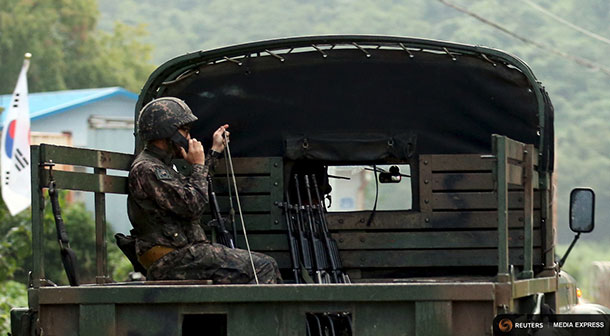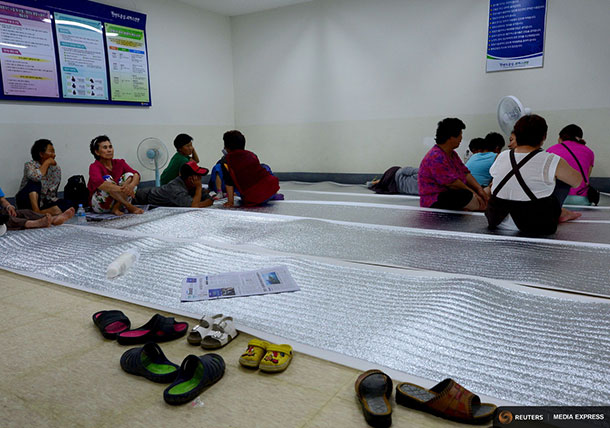

SEOUL (Reuters) – North and South Korea appeared headed towards another clash, as Seoul refused an ultimatum that it halt anti-Pyongyang propaganda broadcasts by Saturday afternoon or face military action, and North Korea said its troops were on a war footing.
South Korean Vice Defence Minister Baek Seung-joo said on Friday it was likely the North would fire at some of the 11 sites where the loudspeakers are set up on the South’s side of the Demilitarised Zone (DMZ) separating the countries.
Tension escalated on Thursday when North Korea fired four shells into South Korea, according to Seoul, in apparent protest against the broadcasts. The South fired back 29 artillery shells. Pyongyang accused the South of inventing a pretext to fire into the North.
Both sides said there were no casualties or damage in their territory, an indication that the rounds were just warning shots.
“The fact that both sides’ shells didn’t damage anything means they did not want to spread an armed clash. There is always a chance for war, but that chance is very, very low,” said Yang Moo-jin, professor at the University of North Korean Studies in Seoul.
Since the 1950-53 Korean War ended in a truce, not a peace treaty, Pyongyang and Seoul have often exchanged threats, and dozens of soldiers have been killed, yet the two sides have always pulled back from all-out war.

But the renewed hostility is a further blow to South Korean President Park Geun-hye’s efforts to improve North-South ties, which have been virtually frozen since the deadly 2010 sinking of a South Korean navy ship, which Seoul blames on Pyongyang.
Park cancelled an event on Friday and made a visit to a military command post, dressed in army camouflage.
Both sides traded harsh rhetoric late on Friday.
The North committed “cowardly criminal acts,” South Korean Defence Minister Han Min-koo said. “This time, I will make sure to sever the vicious cycle of North Korea’s provocations.”
The North’s official KCNA news agency said its military was not bluffing.
SOUTH SAYS WON’T STOP BROADCASTS
The North’s shelling came after it had demanded last weekend that South Korea end the broadcasts or face military action – a relatively rare case of following up on its frequent threats against the South.
Its 48-hour ultimatum, delivered in a letter to the South Korean Defence Ministry, was also uncharacteristically specific, said John Delury, a North Korea expert at Yonsei University in Seoul. The deadline is around 5 p.m. (0800 GMT) on Saturday in Seoul.
South Korea began blasting anti-North propaganda from loudspeakers on the border on Aug. 10, resuming a tactic both sides had stopped in 2004, days after landmines wounded two South Korean soldiers along the DMZ.
North Korea on Monday began its own broadcasts.
Baek told parliament the South’s broadcasts would continue unless the North accepted responsibility and apologised for the mines. Pyongyang has denied responsibility.
“There is a high possibility that North Korea will attack loudspeaker facilities,” Baek said.
KCNA said North Korean leader Kim Jong Un had declared a “quasi-state of war” in frontline areas.
There were indications the North was preparing to fire short-range missiles, the South’s Yonhap news agency said, citing an unnamed government source. The North often fires rockets into the sea during annual U.S.-South Korean military exercises, which are currently under way.
The U.S. military, which bases 28,500 personnel in South Korea, said it was monitoring the situation.
Washington earlier urged Pyongyang to halt “provocative” actions after Thursday’s exchange of fire, the first between the two Koreas since October.
Daniel Pinkston of the International Crisis Group think-tank said the large U.S. troop presence in the South for the military exercises could reduce the risk of escalation by pressuring the South to exercise restraint, and as a deterrent to the North.
“This is a bad time to pick a fight with the South while it has all these resources there,” he said.
(Reporting by Ju-min Park and James Pearson, with additional reporting by Choonsik Yoo, Hooyeon Kim and Jack Kim; Writing by Tony Munroe; Editing by Dean Yates, Will Waterman and Ian Geoghegan)







